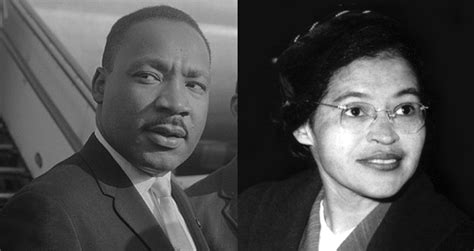Rosa Parks and Martin Luther King Jr. are two of the most iconic figures in American history, both playing pivotal roles in the Civil Rights Movement of the 1950s and 1960s. While they shared a common goal of fighting for racial equality and social justice, their approaches, backgrounds, and legacies differ in many ways. In this article, we will explore the 5 key differences between Rosa Parks and Martin Luther King Jr., shedding light on their unique contributions to the movement.
Early Life and Background

Rosa Parks was born on February 4, 1913, in Tuskegee, Alabama, to James and Leona McCauley. She grew up in a family of former slaves and was raised with a strong sense of self-respect and determination. Parks' early life was marked by racism and hardship, which shaped her resolve to fight for equal rights.
Martin Luther King Jr., on the other hand, was born on January 15, 1929, in Atlanta, Georgia, to Martin Luther King Sr. and Alberta Williams King. King Jr.'s family was part of the African American middle class, and his father was a prominent Baptist minister. King Jr.'s early life was marked by a strong sense of faith and a commitment to social justice.
Approach to Activism
Different Approaches to Achieving Social Change
Rosa Parks' approach to activism was more grassroots-oriented, focusing on local issues and mobilizing her community to take action. Her famous act of defiance on the Montgomery bus in 1955 was a spontaneous response to years of racist treatment, and it sparked a wave of protests and boycotts that led to the desegregation of public transportation in Montgomery.
Martin Luther King Jr., on the other hand, took a more national approach to activism, using his charisma and oratory skills to mobilize people across the country. King's leadership in the Montgomery Bus Boycott, the March on Washington, and the Selma to Montgomery Marches helped to galvanize the Civil Rights Movement and bring attention to the plight of African Americans.
Leadership Style
Rosa Parks: A Quiet Strength
Rosa Parks was known for her quiet strength and determination. She was a behind-the-scenes leader who worked tirelessly to organize and mobilize her community. Parks' leadership style was characterized by her willingness to listen and empower others, often preferring to remain in the background and let others take the spotlight.
Martin Luther King Jr., on the other hand, was a more visible leader who used his charisma and oratory skills to inspire and mobilize people. King's leadership style was characterized by his ability to articulate a clear vision for social change and to mobilize people to take action.
Legacy

Rosa Parks' legacy is often overlooked, but her contributions to the Civil Rights Movement are undeniable. She continued to work tirelessly for social justice until her death in 2005, leaving behind a legacy of courage and determination.
Martin Luther King Jr.'s legacy, on the other hand, is more widely recognized. He is remembered as a national leader who helped to bring about significant social change through his advocacy for nonviolent civil disobedience. King's legacy continues to inspire people around the world to work towards social justice and human rights.
Impact on the Civil Rights Movement
Two Different Paths to Social Change
Rosa Parks' act of defiance on the Montgomery bus in 1955 sparked a wave of protests and boycotts that led to the desegregation of public transportation in Montgomery. Her actions also helped to galvanize the Civil Rights Movement, inspiring others to take action.
Martin Luther King Jr.'s leadership in the Montgomery Bus Boycott, the March on Washington, and the Selma to Montgomery Marches helped to bring national attention to the plight of African Americans and to mobilize people across the country to work towards social change.
Gallery of Civil Rights Movement






FAQ Section
Who was Rosa Parks?
+Rosa Parks was an African American civil rights activist who became famous for her act of defiance on a Montgomery bus in 1955.
What was Martin Luther King Jr.'s role in the Civil Rights Movement?
+Martin Luther King Jr. was a national leader in the Civil Rights Movement, advocating for nonviolent civil disobedience and mobilizing people across the country to work towards social change.
What was the significance of the Montgomery Bus Boycott?
+The Montgomery Bus Boycott was a pivotal event in the Civil Rights Movement, sparked by Rosa Parks' act of defiance on a Montgomery bus in 1955.
In conclusion, while Rosa Parks and Martin Luther King Jr. shared a common goal of fighting for racial equality and social justice, their approaches, backgrounds, and legacies differ in many ways. By understanding these differences, we can gain a deeper appreciation for the complexities of the Civil Rights Movement and the many paths to social change.
